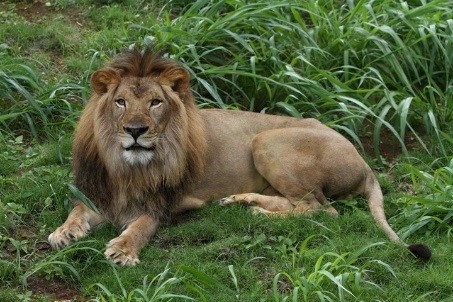By Staff Reports
(Oahu)– It is with sadness that the Honolulu Zoo announces Ekundu, a 13-year old male lion with underlying health conditions died on Monday, Oct. 11, 2021.
Both Ekundu and 12-year old female lion, Moxy, first showed signs of an upper respiratory illness with some coughing on Monday, Oct. 4, 2021. Samples were immediately collected from both lions to test for SARS-CoV-2, the virus that causes COVID-19 in humans.
Ekundu, who has been treated for epilepsy for more than five years, began to get sicker until he was no longer eating. Once he could no longer receive his supportive medication in food, veterinary and animal care teams decided to anesthetize him to provide treatment such as antibiotics, fluid therapy, and other medications to help him feel better. At the same time, more specific samples could be collected for further testing of other possible causes of his respiratory disease. Ekundu’s upper respiratory symptoms resolved in response to the treatments, but he began to show signs of lower respiratory disease with more difficulty breathing over the next few days. Despite round the clock monitoring and continued treatment, Ekundu passed away one week after his signs initially presented.
Due to testing being performed at mainland laboratories, the results revealing both lions were positive for SARS-CoV-2 were only received after Ekundu’s passing. In anticipation of a COVID link, veterinary care staff instituted treatment and biohazard protocols consistent with what other AZA-accredited zoos have implemented in response to SARS-CoV-2 outbreaks around the country. Zoo veterinarian Jill Yoshicedo shared that “while most SARS-CoV-2 infections in large non-domestic cats have been mild illnesses that respond well to supportive care, Ekundu was unfortunately one of the newer cases where COVID seems to be linked to severe pneumonia and tragic loss of life in these species.”
The zoo is currently awaiting confirmatory testing for SARS-CoV-2 as well as pathology results which will help determine the extent of the role the viral infection played in his death. While Moxy’s symptoms seemed to quickly diminish, staff are carefully monitoring and continue to provide her with supportive care and treatment. Moxy’s condition appears to be currently stable and on track to a full recovery.
The source of the lions’ infection remains unknown. All staff in close contact with the lions were previously vaccinated and compliant with the City’s employee vaccination policy. They were also tested for COVID-19 and found to be negative. Zoo staff continue to practice strict biohazard protocols to prevent any spread of the virus to other animal areas.
Zoo Director Santos noted, “I commend our veterinary and keeper staff for their tireless efforts and care for Ekundu. As the only male lion at the Honolulu Zoo, Ekundu was beloved and iconic. The zoo ohana is very saddened with his passing, and are working together to remain focused on the health and welfare of Moxy, and the care for the rest of our animals in the zoo.” Santos further stated, “As animals can contract COVID-19 from humans, our staff are reminded to constantly and consistently work safely and follow protocols to keep our animals safe. We also would like to take this opportunity to remind all guests visiting the zoo to wear a mask in the identified zoonotic-risk animal areas which include primates, cats, dogs and hoofstock.”
Ekundu was born on November 2, 2007 and came to the Honolulu Zoo in 2010. Along with his mate, Moxy, they raised three lion cubs which have been transferred to other zoos as part of the Association of Zoos and Aquarium’s (AZA) Species Survival Plan. African lions typically live up to 15-25 years in captivity.

